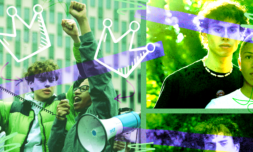We spoke to the Gen Z lawyer and author about their ground-breaking debut book, the complexities of India’s LGBTQ+ movement, and why bridging law and activism is crucial.
Rohin Bhatt’s advocacy journey began at a pivotal moment in their life.
As a young law student coming to terms with their own identity, they found themselves deeply affected by the landmark legal decisions shaping India’s queer rights landscape.
‘I remember breaking down reading that [the Navtej Singh Johar case] had happened,’ they tell Thred, recalling the 2018 ruling that decriminalised homosexuality in India. ‘I was hardly aware of my queerness. I had kind of come out to myself, but not to the world at large.’
This personal connection to the cause has fuelled Bhatt’s work, propelling them to the forefront of India’s queer rights movement as both a lawyer and an author.
Their debut book, The Urban Elite versus Union of India, is a blend of memoir and sharp legal analysis, arriving at a crucial juncture in the ongoing struggle for equality across the country.
It’s a unique window into the evolving landscape of queer rights in India, examining recent legal developments through professional insights and personal anecdotes.
A central theme is the Supreme Court’s recent refusal make same-sex marriage legal, which Bhatt argues is representative of an ‘unfulfilled constitutional promise.’
‘When we gave unto ourselves the constitution, we made a promise to only constitute one class of citizens,’ they say.
View this post on Instagram
‘And all the people of India – irrespective of their caste, creed, gender, race, sexual orientation – were assured of three basic promises: equality, liberty, and fraternity.’
In Bhatt’s opinion, the Supreme Court’s decision falls short of this foundational principle and they warn of potentially far-reaching consequences.
‘If tomorrow Parliament were to enact a law that says inter-caste couples cannot marry or interfaith couples cannot marry… those legislations, if their decision is considered to be correct, are constitutionally permissible.’
Despite this criticism, however, Bhatt is pragmatic about the path forward. ‘The arc of justice is long, but eventually it bends towards justice,’ they say, emphasising a need for persistent engagement with legal institutions.
Their balanced approach is characteristic of their dual role as both lawyer and activist, a delicate equilibrium they navigate on a daily basis.
‘When I put on that black gown and jacket every morning, I leave my activism behind,’ they say, explaining that the way they see it, wearing multiple hats ‘is not necessarily a bad thing,’ because ‘it’s impossible to lose the gravity of the movement you are standing in.’
In terms of the broader queer rights movement in India, Bhatt offers a nuanced perspective that acknowledges both its strengths and challenges.
‘Like any other social movement, it is the great Indian family. People fight amongst each other, or disagree, or don’t get along.’
View this post on Instagram
This metaphor aptly captures the internal tensions that Bhatt themself has observed within the movement.
They point to disparities between urban and rural experiences, as well as the dominance of certain voices within the community.
‘Even today, this is a trend,’ they say. ‘It continues to be developed, sorry, dominated by those who belong to the urban elite.’
Yet they’re quick to highlight the important work being done behind closed doors.
‘For years, people such as Vyjayanti Vasanta Mogli and Grace Banu have been tirelessly campaigning away from the limelight to address issues like social security for transgender people,’ they add.




















